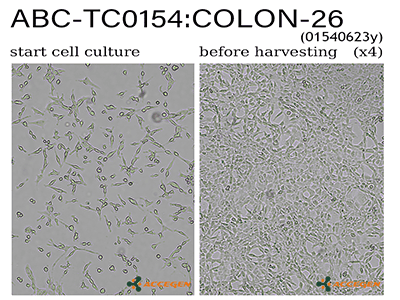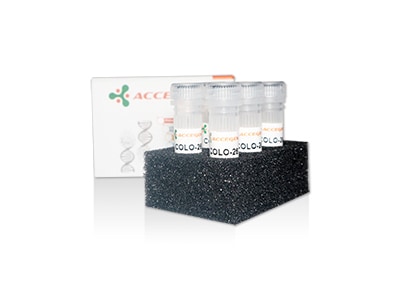Home > Products > Tumor Cell Lines > Animal Tumor Cell Lines >
Colon-26 |
||||
|---|---|---|---|---|
| Product Name |
Colon-26 |
|||
| Price | Get Quote | |||
| Cat.No |
ABC-TC0154 |
Species |
Mouse |
|
| Size/Quantity |
1 vial |
Biosafety Level |
1 |
|
| Shipping Info |
Dry Ice |
Storage |
Liquid Nitrogen |
|
| Description |
Why choose Colon-26 from AcceGen? Colon-26 from AcceGen has the best quality and has passeed an entire examination of quality control under the rigorous regulations and rules. Colon-26 is produced in Accegen’s world-class laboratory with standardized operating procedure. AcceGen supports colon-26 with safety packaging, high-speed delivery, and competitive price. |
|||
| Citation Guide |
When you publish your research, please cite our product as “AcceGen Biotech Cat.# XXX-0000”. In return, we’ll give you a $100 coupon. Simply click here and submit your paper’s PubMed ID (PMID). |
|||
| Application | FOR RESEARCH USE ONLY The colon-26 cells were used to build the cachectic mouse model for the research of the cancer cachexia, which is a syndrome of progressive loss of skeletal muscle mass and adipose tissue, causing weight loss and weakness. After inoculation of colon-26 cells, the following syndromes were observed in the transplanted mice: the sustaining and extensive weight loss as tumor growth, hypoglycemia, hypercorticism, and disorders of hepatic functions. With the growth of colon-26 tumor, the skeletal muscle and adipose tissues were both progressively lost, and the muscle cross-sectional area and muscle strength were reduced. This depletion of muscle tissue, induced by the colon-26 tumor, might be involved in the activation of proteolytic systems of skeletal muscle. The cytokine IL-6 is essential but not entirely sufficient for causing cachexia. Hence, anti-IL-6 antibody can be considered as an effective way to prevent the weight loss induced by cachexia. Otherwise, colon-26 cell line can be used for metastasis studies. The injection of colon-26 cell line into the spleen of wild-type mice induced the expression of tumor necrosis factor alpha (TNF-alpha) and the formation of subsequent liver metastasis, which is possibly mediated by tumor necrosis factor receptor p55 signaling. |
|||
| Growth Conditions | 37 ℃, 5% CO2 |
|||
| Product Type |
Mouse Colon Cancer Cell Lines |
|||
| Product Image | ||||
- ONLINE INQUIRY
- PRODUCT REVIEWS
Fill out a request in the form below and we’ll get back to you within 24 hours with a quote.






 Colon-26 is a mouse colon adenocarcinoma cell line derived from the tumor tissue of Balb/c mice bearing Colon-26 carcinoma, induced by single rectal application of N-Nitroso-N-Methyl-urethan (NMU). Colon-26 should be cultured in RPMI1640 supplemented with 10% FBS, and the doubling time of Colon-26 is 15-20 hours.
Colon-26 is a mouse colon adenocarcinoma cell line derived from the tumor tissue of Balb/c mice bearing Colon-26 carcinoma, induced by single rectal application of N-Nitroso-N-Methyl-urethan (NMU). Colon-26 should be cultured in RPMI1640 supplemented with 10% FBS, and the doubling time of Colon-26 is 15-20 hours.
